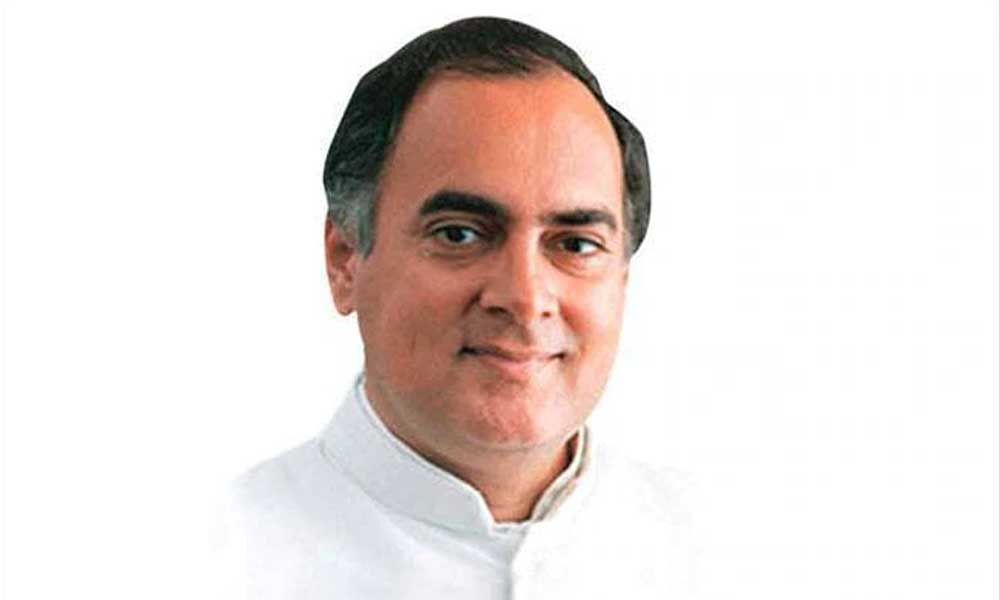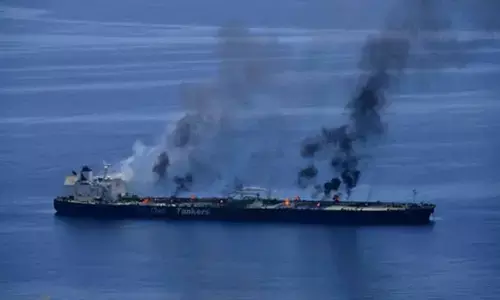Remembering Rajiv Gandhi

Former Prime Minister Rajiv Gandhi's 75th birth anniversary was observed throughout the country on Tuesday with fervour.
Former Prime Minister Rajiv Gandhi's 75th birth anniversary was observed throughout the country on Tuesday with fervour. Congress leaders paid homage for the initiatives he had taken to modernise India and to take it into 21st century. How do we remember Rajiv Gandhi, or any other leader for that matter? There are three ways of remembering the leaders depending on which side you are. One would like to see only the positive aspect. The other would be eager to point out the failures. Both are subjective. The objective way is to take both successes and failures into consideration and assess the leader's personality in an unbiased manner. Pandit Nehru can be credited with building a new India. He can also be criticised for losing a war to China. Indira Gandhi can be praised (Vajpayee called her Durga Maata) for handing a humiliating defeat to Pakistan and liberating East Pakistan and founding Bangladesh. She can also be held guilty of Emergency excesses. PV Narasimha Rao can be hailed as a reformer who brought Indian economy back from the precipice and demolished the cursed licence and permit raj leading to spectacular growth. He can be castigated for allowing Babri Masjid to be felled by the Hindu zealots. Like any other leader, Rajiv Gandhi also had his quota of plus and minus points.
Objective assessment
Rajiv's political life started late and ended very early and abruptly. He was the only leader who worked for an organisation for a living before becoming prime minister. He was a pilot with Air India. The sudden death of his younger brother Sanjay Gandhi in an air crash in Delhi in 1980 forced Rajiv to step into his brother's shoes to help his mother. The assassination of Indira Gandhi by her Sikh guards catapulted Rajiv into prime minister's chair at the age of 40 making him the youngest top political executive of the country. Soon after taking over, he went for fresh elections. The Congress party won more than 400 out of the 543 Lok Sabha seats in 1984 elections, thanks to the sympathy wave in favour of the ruling party on account of Indira Gandhi's assassination.
Rajiv Gandhi was prime minister from 1984 to 1989. When he took the oath, he was at an angle who cannot do anything wrong. In the first year everything went on well for him. Even his gaffes were taken lightly. The next two years were trying. Everything went wrong in the final phase resulting in a disaster. Adopting modern approach to governance, panchayat raj reforms, anti-defection act, bringing peace to Assam and Mizoram, modernising the army and reforms in higher education top the list of good things Rajiv had achieved. Rajiv's critics cite his handling of Shah Bano case in the wake of the Supreme Court judgment, which he diluted by amending the constitution to appease maulvis. Allowing Shilanyas at Ayodhya is termed as another blunder which was followed by launching 1989 election campaign from that very place promising 'Rama Rajya.' He was advised by his colleagues in the party to opt for soft hindutva line. Jawarlal Nehru or Indira Gandhi would never have done it. Rajiv's detractors say he paved the way for the growth of Hindutva and the consequent demolition of Babri Masjid. It can be said without any fear of contradiction that Shilanyas helped BJP, which won just two Lok Sabha seats in 1984 elections, to rise and capture power at the centre. He was accused of alienating Dalits, Muslims and the Backward Classes from the Congress helping in the process the likes of BSP, SP and RJD to emerge and consolidate. Bofors episode was his undoing. Sending Indian Peace Keeping Force (IPKF) to Sri Lanka did not go well either.
'I have my dreams'
Rajiv cannot be accused of manipulation. He is not capable of it. He can be found fault for arrogance and tactlessness. He was unblemished and clean when he took over the reins. He was cheered lustily when he told American Parliament that he is young and he has his dreams. People believed him when he told at a public meeting on the occasion of AICC conclave in Mumbai that he would end corruption in the party. He told the delegates that out of one rupee spent by government on welfare measures, only 15 paise reach the poor and the needy. The rest is pocketed by middlemen. It was not possible for him to root out corruption. Rajiv was no different from others who preceded him as party presidents. The credit for ushering peace in Assam and Mizoram goes to him. He held talks with Assam student leaders Prafulla Mohanta and Bhrigu Phukan for hours and days. On some occasions, the talks went into small hours in morning. He had successfully resolved Mizoram issue by having negotiations with rebel leader Lal Denga. Rajiv knew that his party was not going to gain either in Assam or Mizoram. He always thought country is more important than his party. When Rajiv visited Assam for election campaign after the accord was signed, he waved smilingly at the people who were shouting 'Rajiv Gandhi Jindabad, Congress party murdabad.' He tried to end violence in Punjab, but the killing of Sant Longowal by terrorists damaged the prospects of peace. After signing an accord with Harcharan Singh Longowal, Rajiv was accused of failing to protect the life of the Sikh leader. Terrorism in Punjab spread its tentacles during Rajiv's tenure. Top terrorists made Canada their base to propagate Khalistan message. Rajiv ordered 'Operation Blue Thunder' in 1988 to quell the terror groups. The operation was far more successful than 'Operation Blue Star' conducted under Indira Gandhi's watch, which allegedly took more lives than warranted. It was PV Narasimha Rao who ultimately tamed the terrorists and brought peace back to Punjab with the active cooperation of super cop KPS Gill. Top terrorist Gurbachan Singh Manochahal was considered a major threat to Rajiv and his family. The dreaded terrorist was ultimately arrested. The unabated violence in Punjab truly bothered Rajiv throughout the second half of his term.
Grass roots democracy
Panchayat Raj and Nagara Palika Bills were the result of hard work on part of Rajiv Gandhi who spoke to almost all the district collectors in the country. He was extremely keen on devolution of powers and funds. He wanted to send money to Panchayats straight without routing through the State governments. When he was told by a reporter at a press conference that the State governments run by Congress party are not prepared to part with powers, Rajiv replied saying that was all the more reason why an Act is needed to force State government to devolve powers to local bodies and Panchayati Raj institutions. 'No politician would like to part with power,' he commented. Rajiv himself introduced Constitution Amendment Bills and got them approved in Lok Sabha. It fell short by five votes in Rajya Sabha. The 73rd and 74th Amendments were ultimately passed by Parliament during PV Narasimha Rao's tenure. Rajiv recognised the fact that India is an ancient country, but a young nation. He got the 61st Constitutional Amendment lowering the voting age from 21 to 18, giving the youth an opportunity to get involved in practical democracy. He was an icon for the youth of the country.
Strengthening Defence
Rajiv Gandhi presented a step by step proposal for nuclear disarmament in the UN. He modernised Indian Army and Navy. It was his government that had exceeded the unwritten limit of 4% of the GDP for defence budget. He spent about 4.25% of the GDP at that time. It was his regime that purchased Mirage 2000 fighters and MIG fighter. The highly controversial Bofors guns, which marred his career although he was proved innocent in the courts, are the best bet even today. The Kargil war could be won because of the Bofors guns. The armaments procured during Rajiv's rule more than three decades ago are being used even today by the Indian army. Rajiv and Arun Singh, the defence minister in early years, did a wonderful job in strengthening the armed forces.
Computer Revolution
Rajiv Gandhi and his close friend Sam Petroda brought about telecom revolution in India. It was during Rajiv's tenure that Public Call Offices (PCOs) were introduced connecting rural India to outside world. 'Having missed industrial revolution, India cannot afford to miss computer revolution,' he said. They were planning software exports in those days itself. Centre for Development of Telematics (C-DOT) was Rajiv's initiative. He is rightly called the Father of Indian Information Technology. Rajiv also laid foundation for the economic reforms that were introduced in 1991 after he passed away. The election manifesto released by the Congress party in 1991 elections spoke of economic reforms. The manifesto committee was headed by PV Narasimha Rao and the manifesto was released by Rajiv Gandhi.
Rajiv might have committed a number of mistakes. But he was a patriot to the core. The place and the way he was killed had put separatist sentiments in Tamil Nadu to rest. He wanted India to grow as a regional power. That was why, he sent commandos to rescue the president of Maldives, who was under seize. Indian commandos successfully foiled the coup and got the president released. The idea behind sending IPKF to Jaffna also was to act as a big brother helping a neighbouring country. His intentions cannot be faulted. Rajiv did many good things. He also had some failures in his account. He is a martyr who laid his life for his country.








